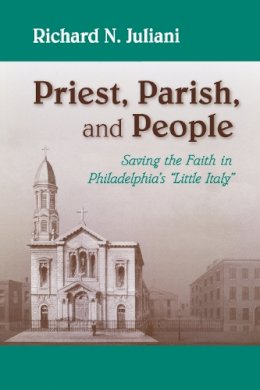Richard N. Juliani is professor of sociology at Villanova University.
"This is a well-written, in-depth study of Philadelphia's Italian Catholic community. Focusing on a parish and its remarkable pastor, it chronicles the progress of an Italian immigrant parish from its earliest days in the mid-nineteenth century to its emergence as the social and religious center for the Italian community in the early twentieth century. For the author, writing this history was clearly a labor of love. He has provided all of us with a chapter in the history of Philadelphia Catholicism that was long overdue." —Jay P. Dolan, author of In Search of an American Catholicism: A History of Religion and Culture in Tension “Juliani tells us convincingly that, to fully understand the phenomenon, on which is, above all else, the central experience of America—immigration/assimilation—we cannot, and should not, separate biographical, institutional, and sociocultural realities. These realities he illustrates for us in the Little Italy section of Philadelphia by interweaving the histories of a priest, a parish, and a people.” —The Catholic Historical Review The story of this priest, his parish, and his people provides an intimate window into the development of one city's Italian-American community and holds broader implications for the study of immigration and Catholicism in the late nineteenth and early twentieth centuries. . . this richly detailed study will be of great interest to scholars of Catholic and immigration history.” —The Journal of American History “Richard N. Juliani made an inspired choice in placing Father Antonio Isoleri-who served as pastor from 1870 to 1926 of the nation's first dedicated Italian parish-at the center of an historical monograph. . . . Scholars of immigration and ethnicity will find that the book touches on many significant topics.” —Journal of American Ethnic History “Written by a professor of sociology, Priest, Parish, and People studies the historical development and complex communal relationships that marked parish life in Philadelphia's 'Little Italy' from incipient Italian immigration through the early 1930s . . . the author provides a significant micro-study not only of the cultural transformation of an important urban Italian community but also of its interaction with the political and religious fortunes of Catholicism in Italy and the United States.” —Church History “As Richard N. Juliani discovered, it was impossible to separate Isoleri's personal history from that of the institution to which he devoted his life. The expanded focus also permitted Juliani to examine the social and religious experience of Isoleri's Italian parishioners. What was the nature of their encounter with Catholicism in the American context? What role did religion play in the creation of the ethnic community? Questions like these are hardly new, but since the literature on Italian American religion is still relatively thin, they are well worth asking in this context.” —American Historical Review “Richard Juliani has written a history of Saint Mary Magdalen de Pazzi parish . . . a reference work for students of American Catholicism, Italian Americans, the Order of Saint Augustine, or Philadelphia, a thought-provoking read for scholars of biography and urban community, and a model for graduate students.” —American Catholic Studies “Italians began arriving in the US in the 19th century, eventually becoming one of the nation’s largest ethnic groups. Juliani . . . offers a detailed portrait of the history of St. Mary Magdalen de Pazzi, the first church created to serve the particular needs of the residents of Philadelphia’s Little Italy . . . the book offers a rich descriptive account.” —Choice "Rich in detail and culled from an array of primary sources, including the extensive writings of the second pastor of St. Mary Magdalen dePazzi, Richard Juliani weaves a masterful story. By tracing the nuanced interconnections between this first Italian national parish in the United States, its formidable pastor, and the growing immigrant community in South Philadelphia, this book provides new insights about Americanization and the formation of ethnic identity. Priest, Parish, and People is essential reading for scholars of American religion, immigration and urban history, and for anyone wanting to understand the Italian American experience." —Joan Saverino, Ph.D., The Historical Society of Pennsylvania "While Priest, Parish, and People is in itself a rich ethnographic story about a most unusual priest, a particular Philadelphia parish, and the growth of parishes to meet the needs of a rapidly growing immigrant population, it is also an important story of the struggle between Irish and Italian cultures in the assimilation process, and an interesting insight into church politics and the workings of the Roman Catholic Church." —William V. D'Antonio, Catholic University of America

